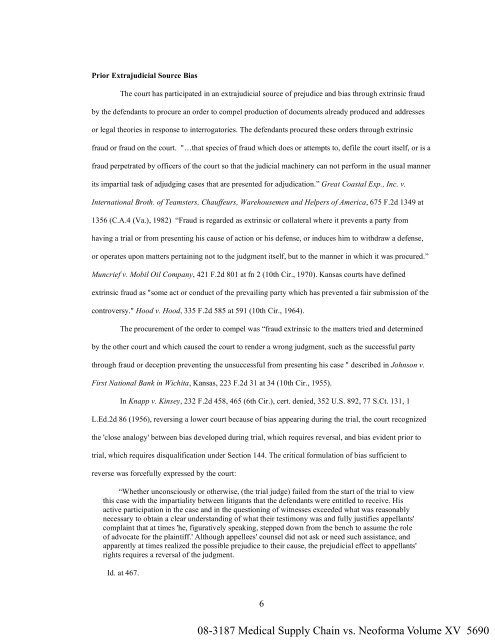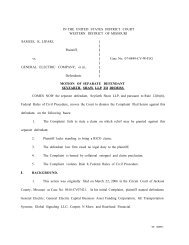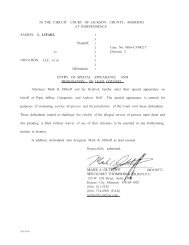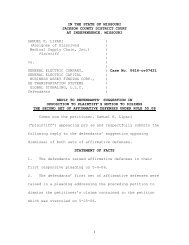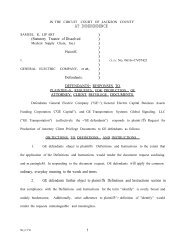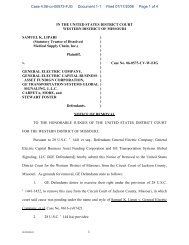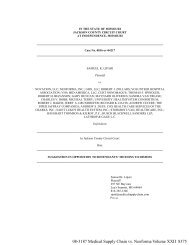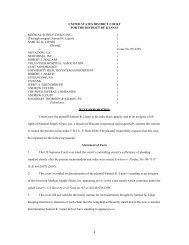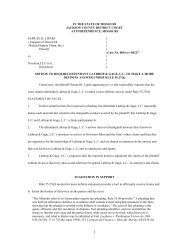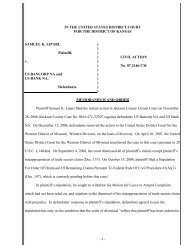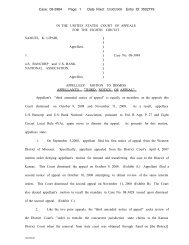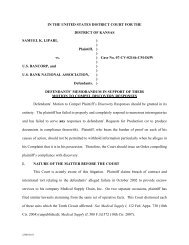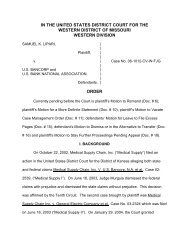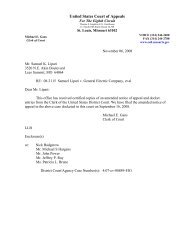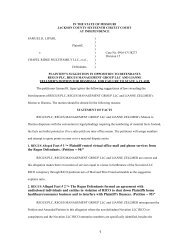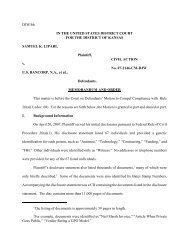- Page 1 and 2:
IN THE UNITED STATES DISTRICT COURT
- Page 3 and 4:
Respectfully submitted, /s/ Jay E.
- Page 5 and 6:
After the instant Motion to Compel
- Page 7 and 8:
Thus, under Rule 26(a)(1)(A)(i), Pl
- Page 9 and 10:
help focus the discovery efforts of
- Page 11 and 12:
With respect to the first requireme
- Page 13 and 14:
Defendants, are documents that he (
- Page 15 and 16:
IT IS SO ORDERED. Dated in Kansas C
- Page 17 and 18:
2008 pretrial conference, and an Au
- Page 19 and 20:
motive on the part of the movant, r
- Page 21 and 22:
Plaintiff’s contention that he ne
- Page 23 and 24:
08-3187 Medical Supply Chain vs. Ne
- Page 25 and 26:
08-3187 Medical Supply Chain vs. Ne
- Page 27 and 28:
08-3187 Medical Supply Chain vs. Ne
- Page 29 and 30:
08-3187 Medical Supply Chain vs. Ne
- Page 31 and 32:
08-3187 Medical Supply Chain vs. Ne
- Page 33 and 34:
08-3187 Medical Supply Chain vs. Ne
- Page 35 and 36:
08-3187 Medical Supply Chain vs. Ne
- Page 37 and 38:
08-3187 Medical Supply Chain vs. Ne
- Page 39 and 40:
08-3187 Medical Supply Chain vs. Ne
- Page 41 and 42:
08-3187 Medical Supply Chain vs. Ne
- Page 43 and 44:
08-3187 Medical Supply Chain vs. Ne
- Page 45 and 46:
08-3187 Medical Supply Chain vs. Ne
- Page 47 and 48:
08-3187 Medical Supply Chain vs. Ne
- Page 49 and 50:
08-3187 Medical Supply Chain vs. Ne
- Page 51 and 52:
08-3187 Medical Supply Chain vs. Ne
- Page 53 and 54:
08-3187 Medical Supply Chain vs. Ne
- Page 55 and 56:
08-3187 Medical Supply Chain vs. Ne
- Page 57 and 58:
08-3187 Medical Supply Chain vs. Ne
- Page 59 and 60:
08-3187 Medical Supply Chain vs. Ne
- Page 61 and 62:
08-3187 Medical Supply Chain vs. Ne
- Page 63 and 64: 08-3187 Medical Supply Chain vs. Ne
- Page 65 and 66: 08-3187 Medical Supply Chain vs. Ne
- Page 67 and 68: 08-3187 Medical Supply Chain vs. Ne
- Page 69 and 70: IN THE UNITED STATES DISTRICT COURT
- Page 71 and 72: IN THE UNITED STATES DISTRICT COURT
- Page 73 and 74: IN THE UNITED STATES COURT DISTRICT
- Page 75 and 76: FILED United States Court of Appeal
- Page 77 and 78: IN THE UNITED STATES COURT DISTRICT
- Page 79 and 80: plaintiff sanctioned for not produc
- Page 81 and 82: Monday, August 18, 2008 9:06 AM Sub
- Page 83 and 84: method of communication, that it ma
- Page 85 and 86: ********************PRIVATE AND CON
- Page 87 and 88: Monday, August 18, 2008 9:55 AM Sub
- Page 89 and 90: DJW/bh IN THE UNITED STATES DISTRIC
- Page 91 and 92: DJW/bh IN THE UNITED STATES DISTRIC
- Page 93 and 94: IN THE UNITED STATES COURT DISTRICT
- Page 95 and 96: IN THE UNITED STATES DISTRICT COURT
- Page 97 and 98: MARK A. OLTHOFF KS # 70339 SHUGHART
- Page 99 and 100: Not Reported in F.Supp.2d Page 2 No
- Page 101 and 102: DJW/bh IN THE UNITED STATES DISTRIC
- Page 103 and 104: 21, 2008. 4 On August 21, 2008, Def
- Page 105 and 106: Here, the parties have submitted se
- Page 107 and 108: IN THE UNITED STATES COURT DISTRICT
- Page 109 and 110: Whereas the trial judge has not rev
- Page 111 and 112: (mh) (Entered: 08/20/2008) 7. The d
- Page 113: that rejected in Glass v. Pfeffer,
- Page 117 and 118: molthoff@stklaw.com ademarea@stklaw
- Page 119 and 120: supplies. Similarly, the defendant
- Page 121 and 122: JUDICIAL COUNCIL THE TENTH CIRCUIT
- Page 123 and 124: the respondent ordered dismissal of
- Page 125 and 126: Appearance Docket of the subject li
- Page 127 and 128: were parties to the action at the t
- Page 129 and 130: 21. The petitioner had opposed tran
- Page 131 and 132: State Court and the Western Distric
- Page 133 and 134: dismissed, contradicting controllin
- Page 135 and 136: (1) Respondent’s Effect On Litiga
- Page 137 and 138: enter the market where Missouri doc
- Page 139 and 140: 58. Through the petitioner’s lobb
- Page 141 and 142: made by the respondent that would h
- Page 143 and 144: due date for a response to the defe
- Page 145 and 146: Head v. Platte County, Mo., 749 P.2
- Page 147 and 148: this court, we must call attention
- Page 149 and 150: petitioner’s appeal or to other t
- Page 151 and 152: adopted their poorly concealed fals
- Page 153 and 154: without independent review resultin
- Page 155 and 156: The action has the petitioner’s m
- Page 157 and 158: Date: February, 1 st 2008 Office of
- Page 159 and 160: permitted the repeated outcomes her
- Page 161 and 162: JUDICIAL COUNCIL OF THE TENTH CIRCU
- Page 163 and 164: Council. As set out in the miscondu
- Page 165 and 166:
SUMMARY OF DEADLINES AND SETTINGS E
- Page 167 and 168:
UNITED STATES DISTRICT COURT FOR TH
- Page 169 and 170:
MEMORANDUM IN SUPPORT The plaintiff
- Page 171 and 172:
law); Cincinnati Insurance Co. v. B
- Page 173 and 174:
generating source of the power (to
- Page 175 and 176:
Judge Carlos Murguia’s prior deci
- Page 177 and 178:
Case 2:05-cv-02299-CM-GLR Document
- Page 179 and 180:
Case 2:05-cv-02299-CM-GLR Document
- Page 181 and 182:
Case 2:05-cv-02299-CM-GLR Document
- Page 183 and 184:
Case 2:05-cv-02299-CM-GLR Document
- Page 185 and 186:
enter the market. The Defendants ta
- Page 187 and 188:
(1) the attendance of a witness or
- Page 189 and 190:
598. The USA PATRIOT Act reaffirmed
- Page 191 and 192:
611. Defendants’ actions were wil
- Page 193 and 194:
UNITED STATES DISTRICT COURT FOR TH
- Page 195 and 196:
admitted was incorrect about the US
- Page 197 and 198:
government need only prove that the
- Page 199 and 200:
Accordingly, one who opts into or p
- Page 201 and 202:
other elements of the Section 1962(
- Page 203 and 204:
y circumstantial evidence and the l
- Page 205 and 206:
dealers or potential dealers. The p
- Page 207 and 208:
Kilroy reveal the law firm was the
- Page 209 and 210:
US Department Of Justice Post Trial
- Page 211 and 212:
of Liggett; Ernest Pepples of B&W;
- Page 213 and 214:
Certificate of Service I certify th
- Page 215 and 216:
2. I know first hand the consequenc
- Page 217 and 218:
Army officer and an African America
- Page 219 and 220:
Social and Rehabilitation Services
- Page 221 and 222:
answered the complaint and sent add
- Page 223 and 224:
shared. The stress aggravated their
- Page 225 and 226:
objective of eliminating liability
- Page 227 and 228:
14 08-3187 Medical Supply Chain vs.
- Page 229 and 230:
The Hon. Magistrate Judge James P.
- Page 231 and 232:
Bancorp and its investment bank sub
- Page 233 and 234:
the earlier ethics complaint as an
- Page 235 and 236:
misconduct that can remedy its effe
- Page 237 and 238:
Kansas District court would not cor
- Page 239 and 240:
he served as a lawyer in the matter
- Page 241 and 242:
Attorney James P. O'Hara Named U.S.
- Page 243 and 244:
Kansas City, MO. -- January 26, 200
- Page 245 and 246:
08-3187 Medical Supply Chain vs. Ne
- Page 247 and 248:
Exb 13 Atch 3 08-3187 Medical Suppl
- Page 249 and 250:
08-3187 Medical Supply Chain vs. Ne
- Page 251 and 252:
08-3187 Medical Supply Chain vs. Ne
- Page 253 and 254:
08-3187 Medical Supply Chain vs. Ne
- Page 255 and 256:
19 In contrast, as a practical matt
- Page 257 and 258:
02-3443 Medical Supply Chain v. US
- Page 259 and 260:
08-3187 Medical Supply Chain vs. Ne
- Page 261 and 262:
08-3187 Medical Supply Chain vs. Ne
- Page 263 and 264:
08-3187 Medical Supply Chain vs. Ne
- Page 265 and 266:
08-3187 Medical Supply Chain vs. Ne
- Page 267 and 268:
08-3187 Medical Supply Chain vs. Ne
- Page 269 and 270:
08-3187 Medical Supply Chain vs. Ne
- Page 271 and 272:
08-3187 Medical Supply Chain vs. Ne
- Page 273 and 274:
08-3187 Medical Supply Chain vs. Ne
- Page 275 and 276:
08-3187 Medical Supply Chain vs. Ne
- Page 277 and 278:
08-3187 Medical Supply Chain vs. Ne
- Page 279 and 280:
08-3187 Medical Supply Chain vs. Ne
- Page 281 and 282:
08-3187 Medical Supply Chain vs. Ne
- Page 283 and 284:
08-3187 Medical Supply Chain vs. Ne
- Page 285 and 286:
08-3187 Medical Supply Chain vs. Ne
- Page 287 and 288:
08-3187 Medical Supply Chain vs. Ne
- Page 289 and 290:
08-3187 Medical Supply Chain vs. Ne
- Page 291 and 292:
08-3187 Medical Supply Chain vs. Ne
- Page 293 and 294:
08-3187 Medical Supply Chain vs. Ne
- Page 295 and 296:
08-3187 Medical Supply Chain vs. Ne
- Page 297 and 298:
08-3187 Medical Supply Chain vs. Ne
- Page 299 and 300:
08-3187 Medical Supply Chain vs. Ne
- Page 301 and 302:
08-3187 Medical Supply Chain vs. Ne
- Page 303 and 304:
08-3187 Medical Supply Chain vs. Ne
- Page 305 and 306:
08-3187 Medical Supply Chain vs. Ne
- Page 307 and 308:
08-3187 Medical Supply Chain vs. Ne
- Page 309 and 310:
08-3187 Medical Supply Chain vs. Ne
- Page 311 and 312:
08-3187 Medical Supply Chain vs. Ne
- Page 313 and 314:
08-3187 Medical Supply Chain vs. Ne
- Page 315 and 316:
08-3187 Medical Supply Chain vs. Ne
- Page 317 and 318:
08-3187 Medical Supply Chain vs. Ne
- Page 319 and 320:
08-3187 Medical Supply Chain vs. Ne
- Page 321 and 322:
08-3187 Medical Supply Chain vs. Ne
- Page 323 and 324:
08-3187 Medical Supply Chain vs. Ne
- Page 325 and 326:
08-3187 Medical Supply Chain vs. Ne
- Page 327 and 328:
08-3187 Medical Supply Chain vs. Ne
- Page 329 and 330:
08-3187 Medical Supply Chain vs. Ne
- Page 331 and 332:
08-3187 Medical Supply Chain vs. Ne
- Page 333 and 334:
08-3187 Medical Supply Chain vs. Ne
- Page 335 and 336:
IN THE UNITED STATES DISTRICT COURT
- Page 337 and 338:
Dated this 24th day of October, 200
- Page 339 and 340:
lack of health insurance and the co
- Page 341 and 342:
Washington, DC 20004-1206 John K. P
- Page 343 and 344:
United States Court of Appeals for
- Page 345 and 346:
“Defendant's second allegation is
- Page 347 and 348:
3. The defendants were not parties
- Page 349 and 350:
tie-in sales and other means of exp
- Page 351 and 352:
judicata grounds. The court noted,
- Page 353 and 354:
Id pg. 328. d. Identity of claims U
- Page 355 and 356:
Heard v. Board of Pub. Util. of Kan
- Page 357 and 358:
The hospital supply competitors VHA
- Page 359 and 360:
56 states: “By 8/21/04 The NY Tim
- Page 361 and 362:
506 (2002); Crawford-El v. Britton,
- Page 363 and 364:
The burden to state a claim for int
- Page 365 and 366:
502 states: “Defendants through t
- Page 367 and 368:
the conspiracy, agreed to commit pr
- Page 369 and 370:
enterprise." Mason Tenders District
- Page 371 and 372:
“Section 315 of the Patriot Act a
- Page 373 and 374:
saml@medicalsupplychain.com Pro se
- Page 375 and 376:
!"#$%&"'()&$*'+,$&-(%'()!('()&.'/01
- Page 377 and 378:
UNITED STATES COURT OF APPEALS FILE
- Page 379 and 380:
in ensuring that the claims he brin
- Page 381 and 382:
supplies which included the threat
- Page 383 and 384:
Verizon Communications Inc. v. Law
- Page 385 and 386:
Certificate of Service I certify I
- Page 387 and 388:
! "#!$%&!'()&*+,-(&)#!).!%&*&/0!1&*
- Page 389 and 390:
###################################
- Page 391 and 392:
08-3187 Medical Supply Chain vs. Ne
- Page 393 and 394:
08-3187 Medical Supply Chain vs. Ne
- Page 395 and 396:
08-3187 Medical Supply Chain vs. Ne
- Page 397 and 398:
08-3187 Medical Supply Chain vs. Ne


